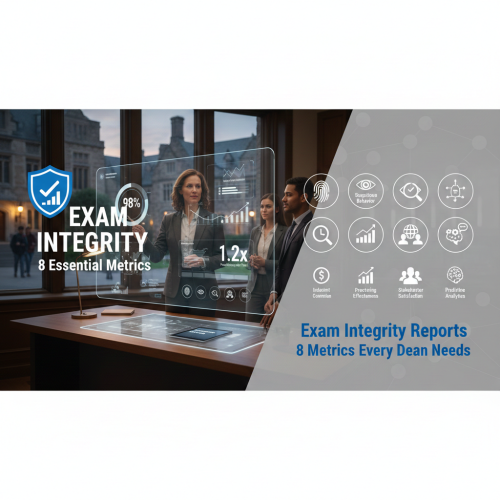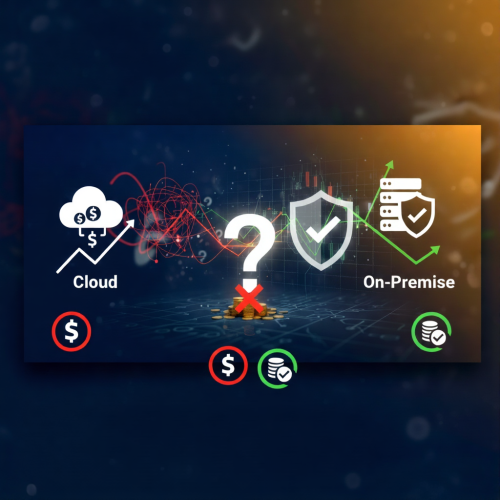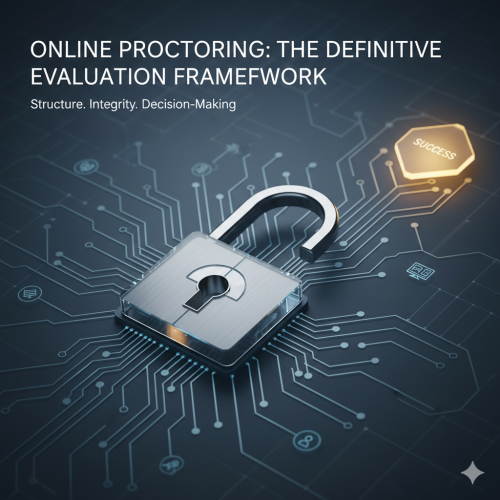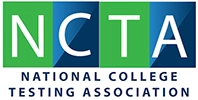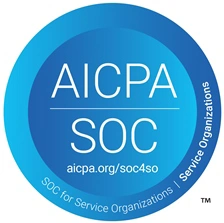In today's competitive job market, pre-hire assessments are invaluable tools for HR managers and executives, offering insights into candidates' skills, personalities, and cultural fit. However, the integrity of these assessments is increasingly compromised by applicants resorting to dishonest tactics. Understanding the implications of such cheating is crucial for maintaining effective hiring processes.
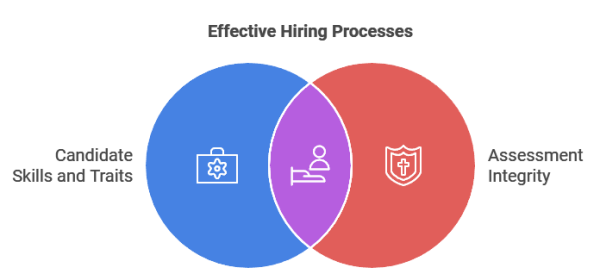
The Prevalence of Cheating in Pre-Hire Assessments
Recent studies highlight a concerning trend: a significant number of job seekers admit to dishonest practices during the hiring process. A survey by Resume Templates found that 15% of respondents confessed to always cheating during their job search, with 20% admitting to occasional dishonesty. Notably, over 10% had someone else complete their assessment tests, 17% searched online for answers when prohibited, and 37% used AI tools like ChatGPT without authorization.
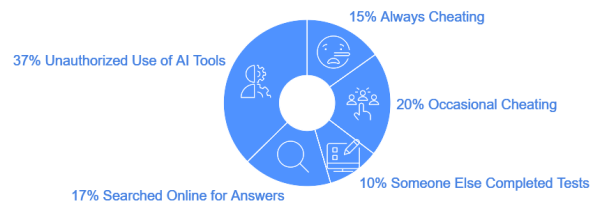
Methods Employed by Candidates to Cheat
Applicants employ various strategies to manipulate assessment outcomes:
- Proxy Test-Taking: When a candidate secures a position through proxy test-taking, the organization faces the immediate risk of diminished job performance, as the individual may struggle to complete even basic responsibilities. This gap between expected and actual abilities can lead to increased supervision and oversight requirements, placing a heavy burden on managers and diverting their attention from strategic tasks. Additionally, team dynamics may suffer as colleagues often need to compensate for the underperformance, which can create resentment and lower morale. In some cases, customers or clients may even notice the lack of quality in deliverables, potentially damaging the organization's reputation and trustworthiness. Over time, these challenges accumulate into significant financial losses, not only in terms of productivity and operational costs but also in turnover expenses, as poorly performing hires are eventually replaced. EmployTest
- Unauthorized Resources: Using unauthorized resources like textbooks, websites, or online forums during assessments is another common way candidates attempt to manipulate their results. This practice not only skews the candidate’s true knowledge and skills but also devalues the purpose of the assessment, which is designed to measure individual aptitude without external support. In unproctored or remotely proctored assessments, candidates might feel emboldened to search for answers online, especially if they believe there is little risk of being detected.
The misuse of these resources can lead to inaccurate hiring decisions, as the individual’s performance during the test does not truly reflect their abilities in a work environment where such resources may not be available. Furthermore, when hiring decisions are based on results compromised by unauthorized aids, employers often find that new hires need more support than expected, which can strain team dynamics and increase onboarding costs. Organizations combat these issues by implementing timed assessments, randomizing questions, and using AI-driven detection tools that monitor browser activity and restrict access to other online resources during testing. EmployTest - AI Assistance: AI assistance has opened a new realm of possibilities for candidates to present polished answers during pre-hire assessments and interviews, even if those answers don't fully represent their capabilities or expertise. Tools like Final Round are just the beginning; numerous AI-driven applications are emerging, capable of analyzing and generating responses in real-time, often customized to match the job description or candidate’s CV details. This type of assistance allows candidates to portray an idealized version of themselves, leveraging AI suggestions to fill knowledge gaps or align more closely with company values.
Additionally, these AI tools can enable candidates to seamlessly switch between pre-scripted responses, reducing the need for authentic, impromptu answers. For employers, this practice distorts the accuracy of assessments, making it difficult to gauge genuine skill levels and communication style, both of which are critical for effective hiring decisions. As AI evolves, this trend raises concerns about how much of a candidate's interaction is authentic versus augmented, pushing HR teams to consider advanced measures like AI-driven detection tools and live monitoring to verify candidate integrity. The Times
Consequences of Cheating for Employers
When candidates cheat on pre-hire assessments, employers face several challenges:
- Loss of Job Performance: misrepresentation in pre-hire assessments can have cascading effects on team dynamics and project timelines. When an employee lacks the necessary skills to meet role requirements, colleagues often need to step in to cover tasks or rectify errors, which detracts from their own responsibilities and can create bottlenecks within projects. Over time, this strain not only lowers team morale but can also lead to burnout among skilled employees who must compensate for underperforming hires. EmployTest
- Legal and Ethical Implications: Hiring individuals who misrepresented their qualifications can expose an organization to lawsuits, especially if an employee's lack of competence leads to errors, safety incidents, or financial losses. Additionally, companies that are known to hire based on unreliable assessments risk damaging their reputation in the industry, which can impact client trust and make it harder to attract high-quality talent. In sectors with strict compliance requirements, such as healthcare or finance, the potential consequences are even greater, as employing underqualified individuals can result in regulatory violations, fines, and long-term impacts on organizational credibility. Lanteria
- Erosion of Workplace Trust: A systemic lack of trust can have a lasting impact on team dynamics and organizational culture. When colleagues learn that a peer entered the company through dishonest means, it can lead to resentment, as others may feel that they’ve had to work harder or prove themselves more honestly. This distrust doesn’t just affect the immediate team—over time, it can lower overall morale and even lead high-performing employees to question the integrity of the hiring process, potentially driving them to seek opportunities in environments where honesty and transparency are prioritized. Lanteria
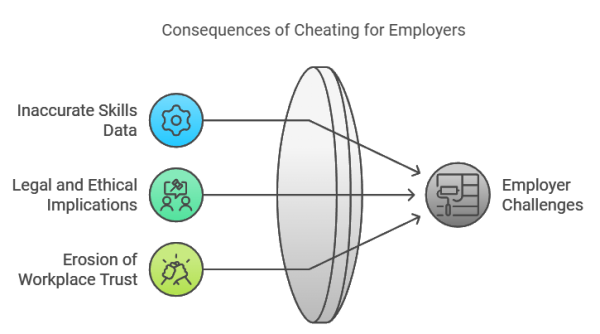
Strategies to Mitigate Cheating in Assessments
To uphold the integrity of the hiring process, HR professionals can implement several measures:
- Clear Communication: Informing candidates about the importance of honesty in the hiring process and clearly outlining the consequences of cheating can create a culture of integrity from the very beginning. When candidates are aware that dishonest behavior can lead to disqualification or even termination if discovered later, they are more likely to approach assessments with transparency and sincerity. Additionally, companies that emphasize honesty in their hiring communications often attract candidates who value ethical practices, which can positively impact the overall quality of hires.
- Advanced Proctoring Techniques: Utilizing technologies such as webcam monitoring and timed assessments is crucial for detecting and preventing cheating during pre-employment testing. Proctor360’s secure proctoring solutions offer both live and automated remote monitoring options, ensuring that candidates are supervised in real-time or via AI-driven review throughout their assessments. With tools like multi-camera setups and behavioral analytics, Proctor360 enables organizations to maintain a high level of assessment integrity, preventing unauthorized resources or proxy test-taking and providing HR teams with reliable, cheat-free results.
- Multiple Assessment Stages: Combining unproctored and proctored assessments provides a dual layer of security that helps detect discrepancies in performance, as candidates are less likely to attempt cheating when they know they will be monitored in subsequent tests. This approach also allows HR teams to assess if candidates perform consistently under different conditions, adding confidence that their skills and competencies are authentic and reliable.
- Adaptive Testing: Computer adaptive tests (CATs) dynamically adjust the difficulty of questions based on the candidate’s responses, creating a unique test experience that makes it difficult to predict or prepare for specific answers. This approach not only discourages cheating but also provides a more accurate measurement of a candidate’s true ability level, as each question adapts to challenge them appropriately based on previous responses, ensuring a thorough assessment of their skills and knowledge.
Bringing It All Together...
Cheating on pre-hire assessments poses significant risks to organizations, from hiring underqualified individuals to facing legal repercussions. By understanding the prevalence and methods of cheating, and by implementing robust preventive measures, HR managers and executives can safeguard the integrity of their hiring processes, ensuring that they select candidates who genuinely possess the skills and qualities required for success.
Proctor360's remote proctoring platform for pre-employment assessments ensures you select the best candidates by verifying their online test sessions, giving you confidence that their results truly represent their abilities.
Eliminate uncertainty with Proctor360's adaptable and cost-effective platform, tailored to meet all your pre-employment testing requirements.

